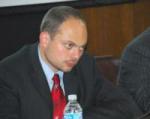
Last week, the Council of Europe, Europe’s oldest intergovernmental body and its main watchdog on human rights, handed the Kremlin a huge victory — and a stinging rebuke. At its session in Strasbourg, the Council’s Parliamentary Assembly voted 118 to 62 to reinstate the full rights of the Russian delegation that were suspended after President Vladimir Putin’s 2014 annexation of Crimea. Delegates from Russia looked triumphant as they took their seats in the chamber of the Palace of Europe.
The delegation appeared intentionally designed to offend every European sentiment. Even the most despotic regime, if it tries, can find half-respectable people to represent it on the world stage; here, it seems, every effort was made to achieve the opposite. The delegation was led by Pyotr Tolstoy, who has attacked Putin’s liberal opponents with anti-Semitic innuendo, and included the former ambassador to the United States, Sergey Kislyak, a central figure in the U.S. investigation of Russian interference in the 2016 election. Leonid Slutsky has faced numerous accusations of sexual harassment by female journalists. And Shamsail Saraliyev is a close associate of Chechen strongman Ramzan Kadyrov, whose regime has presided over a litany of abuses shocking even by the standards of today’s Russia. Four members of the delegation are currently under sanction by the European Union, which had to be waived for the duration of the session.
Yet the vote in Strasbourg was not black and white. Unlike other international platforms — such as the now-defunct Group of Eight that had served as a grand photo opportunity for Putin — membership in the Council of Europe primarily benefits Russian citizens rather than the Kremlin. It gives Russians the legal protections of the European Convention of Human Rights — the gold standard on the continent for more than a half-century — and access to the European Court of Human Rights that enforces it. With national courts serving at the political pleasure of the Kremlin, Strasbourg is often the closest place for Russians to find justice. Last year, most of the court’s decisions concerned Russia. In 96 percent of cases, it sided with the plaintiffs against the government — most prominently when it declared the arrests of anticorruption activist Alexei Navalny to have been politically motivated.
If the Kremlin’s envoys hoped for a political honeymoon in Strasbourg, they did not get one. Among the first documents the assembly turned to after readmitting the Russian delegation was Resolution 2297, which concerns the assassination of Russian opposition leader Boris Nemtsov and the subsequent investigation of it — or, rather, the lack of one.
In a damning verdict, the assembly’s rapporteur, Emanuelis Zingeris of Lithuania, stated that “the Russian authorities did not investigate the murder thoroughly, effectively and in good faith.” (In a gesture of respect for Nemtsov’s memory, and in an unprecedented move for a Baltic delegate, Zingeris delivered his speech in Russian.) He cited the withholding of key evidence and the refusal to question key persons of interest (including Kadyrov, National Guard commander Gen. Victor Zolotov, and State Duma Member Adam Delimkhanov). He described as “unjustifiable” the Russian government’s refusal to recognize Nemtsov’s murder as a political assassination and the artificial limiting of the investigation to the immediate perpetrators.
Zingeris’s report concludes that “it is extremely unlikely that [the convicted killers] . . . being so closely connected to the highest levels of military and political authority in Chechnya, could or would have staged a complex operation to murder a prominent political personality in public in central Moscow without at least the foreknowledge and approval of, if not direct instructions from, their hierarchical superiors.”
This point has been made before — but never, until now, with the legal force of Europe’s largest intergovernmental body. The resolution adopted by the assembly calls on Russian authorities to “reopen and continue their investigation of the murder,” reclassifying it as a political crime. It demands that they locate and release video footage from security cameras, and that they should interrogate “the various Chechen and Russian officials named by the Nemtsov family’s lawyers in order to advance with the investigation into who ordered the murder.”
In a separate vote, the assembly urged the Russian government to “co-operate fully with the international community in the investigation of the murder of Boris Nemtsov” — referring not only to the Council of Europe, but also to the Organization for Security and Cooperation in Europe, which will soon launch its own oversight procedure. Until now, Russian authorities have refused all cooperation — including banning Zingeris from the country and returning his written requests. But their formal excuse for doing so — the absence of a delegation in Strasbourg — has now been removed.
“Russia belongs in the Council of Europe — with all the rights and obligations that entails,” German Foreign Minister Heiko Maas, one of the driving forces behind the return of the Russian delegation, told journalists last week. Now that the rights have been restored, it is time to honor the obligations — and there is no more appropriate place to start than with oversight of the investigation into the most shocking and high-profile political murder in modern Russia.
























